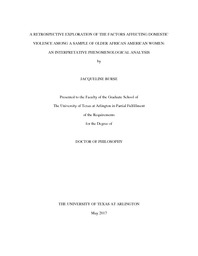
ATTENTION: The works hosted here are being migrated to a new repository that will consolidate resources, improve discoverability, and better show UTA's research impact on the global community. We will update authors as the migration progresses. Please see MavMatrix for more information.
Show simple item record
| dc.contributor.advisor | Woody, Debra | |
| dc.contributor.advisor | Fields, Noelle L. | |
| dc.creator | Burse, Jacqueline | |
| dc.date.accessioned | 2017-07-03T15:04:04Z | |
| dc.date.available | 2017-07-03T15:04:04Z | |
| dc.date.created | 2017-05 | |
| dc.date.issued | 2017-05-04 | |
| dc.date.submitted | May 2017 | |
| dc.identifier.uri | http://hdl.handle.net/10106/26799 | |
| dc.description.abstract | African American women experience domestic violence at a rate that is 35% higher than the domestic violence rate of White women. Moreover, African American women encompass 8% of the U.S. population but account for 22% of domestic violence-related homicide victims. African American women are at greater risk for facing economic difficulties, homelessness, unemployment, and health and educational disparities due to domestic violence. However, little attention has been given to the lived experiences of older women who are domestic violence survivors. No extant literature related to the experiences of African American survivors of domestic violence from a retrospective lens was available, suggesting the need for conducting this study. Therefore, this study explored factors affecting survivorship among African American women aged 55 years and older who experienced domestic violence in the past. Six semi-structured face-to-face interviews were conducted with older African American women to understand their lived experiences as survivors of domestic violence. Theories of phenomenology and hermeneutics provided the theoretical framework for this study. An interpretative phenomenological analysis (IPA) framework guided the research design and data analysis process. Findings resulted in three major themes related to the lived experiences of study participants including understanding the past, acknowledging the journey, and reclaiming and rebuilding life. Study findings also suggest several factors related to domestic violence survivorship, including social support, church, resources, and education. Overall, the findings pointed toward the need for generating more culturally-sensitive and culturally-tailored programs and services to address domestic violence in the African American community. Additionally, services are needed that include faith-based education, training, and prevention programs to enable churches and social workers to address the unique cultural needs of African American women who have endured domestic violence. | |
| dc.format.mimetype | application/pdf | |
| dc.language.iso | en_US | |
| dc.subject | African Americans | |
| dc.subject | Older women | |
| dc.subject | Domestic violence | |
| dc.subject | Faith | |
| dc.title | A RETROSPECTIVE EXPLORATION OF THE FACTORS AFFECTING DOMESTIC VIOLENCE AMONG A SAMPLE OF OLDER AFRICAN AMERICAN WOMEN: AN INTERPRETATIVE PHENOMENOLOGICAL ANALYSIS | |
| dc.type | Thesis | |
| dc.degree.department | Social Work | |
| dc.degree.name | Doctor of Philosophy in Social Work | |
| dc.date.updated | 2017-07-03T15:04:35Z | |
| thesis.degree.department | Social Work | |
| thesis.degree.grantor | The University of Texas at Arlington | |
| thesis.degree.level | Doctoral | |
| thesis.degree.name | Doctor of Philosophy in Social Work | |
| dc.type.material | text | |
Files in this item
- Name:
- BURSE-DISSERTATION-2017.pdf
- Size:
- 1.040Mb
- Format:
- PDF
This item appears in the following Collection(s)
Show simple item record


